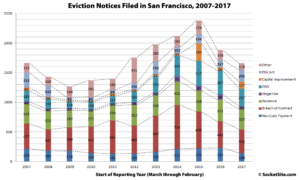
The San Francisco Chronicle reports on the Campos enhanced relocation payment “law die[d] quietly” last week. The “law” in question was actually a pair of efforts in 2014 and 2015, introduced by then-Supervisor Campos, which would increase the relocation assistance payment owed to tenants to be displaced by the Ellis Act, from an inflation-adjusted payment (roughly equal to first and last month’s rent and deposit for a replacement apartment) to a 24-month rent subsidy, compensating for the difference between the displaced tenant’s former rent-controlled rate and fair market value.
The 2014 ordinance was essentially a blank check, where the rent differential could easily reach six figures per unit. Property owners quickly challenged Ordinance 54-14 in both state court (Jacoby v. CCSF) and federal court (Levin v. CCSF). Each court determined that Ordinance 54-14 was invalid. However, the court in Jacoby found that the payment was not “reasonable” under the existing standard for mitigation payments (set forth in Pieri v. City & Cty. of San Francisco (2006) 137 Cal. App. 4th 886), while the Levin court made a determination on constitutional takings grounds, finding the payment was an “exaction” unrelated to the owner’s choice to exit the residential rental market. (It found that the adverse impacts that the payment sought to alleviate were not caused by the landlord’s choice to use the Ellis Act, but by “market forces unrelated to the impact of the property owner’s use of the property”.)
San Francisco tried to institute enhanced mitigation payments again in 2015, with Ordinance 68-15. The second ordinance grafted itself onto the first one (creating some confusion about how and when it was to be applied), capping the payment at $50,000 per unit and providing an administrative review process for landlords who could not afford the increased payment. Again, property owners challenged the ordinance as conflicting with the Ellis Act.
The trial court in Coyne v. CCSF found that the changes did not solve the preemption problems, and reached the same conclusion. The First District Court of Appeal later reviewed Jacoby and Coyne together, finding that the enhanced mitigation payment ordinance imposed a “prohibitive price” on a property owner’s ability to exit the residential rental market, in the published opinion Coyne v. City & Cty. of San Francisco (2017) 9 Cal. App. 5th 1215.
The City (as well as amicus curiae) sought a depublication order from the Supreme Court of California, urging that Coyne v. CCSF created a new preemption standard and, by referencing Levin, improperly extended exactions takings jurisprudence. However, in a unanimous ruling, the Supreme Court denied the requests to depublish and further declined to review the matter on its own motion.









